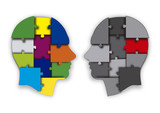Many types of mental health treatment include some form of exploring feelings. In Neurodynamic Couples Therapy, exploring feelings is the pathway to metabolizing and integrating them into a cohesive sense of self and relationships and creating a bond of empathy and understanding between partners. The primary technique we use to explore feelings is what we call “following […]
Couples have a nonconscious, intersubjective system between the two partners that has been existent and developing in complexity since they first met each other. It has been well-established in recent years that this type of system gestates during childhood and becomes the template that dictates who we will be attracted to and commit to as […]
I have written many times about the radical intersubjective stance that Neurodynamic Couples Therapy takes regarding the treatment of couple relationships. In essence, we are treating what happens between the partners–not individual psychologies. The theory holds that it takes two brains in each other’s presence to access the affective material that has been generating the couple’s conflicts […]
Most therapists have had the experience of feeling that a treatment is being derailed and perhaps headed for failure. Even when we are able to see it coming and try to redirect the treatment, it can be like attempting to turn a battleship around (as the saying goes). Instead, it is best to know the […]
In previous blog posts, I have written about the importance of understanding a couple’s persistence in seeing one partner as the identified patient. Quite often, couples will enter treatment with both partners having decided that there is something wrong with the other, and that they themselves are in fact “normal” or “innocent.” Here, our curiosity […]
A major goal of Neurodynamic Couples Therapy is to help partners complete the metabolizing of troublesome emotions, which they have already been nonconsciously attempting to accomplish through their conflicts. Some forms of therapy purport that this metabolizing can be done nonverbally, but we believe that it takes the translation of right-brain experiences into words in […]
As I was growing up, I remember one of the mantras that I heard from some of the adults in my world. They would say one of the best approaches to difficult situations is encapsulated in the acronym KISS–Keep It Simple, (warning! pejorative word coming up) Stupid. I found this to be quite helpful as […]
The New Oxford American Dictionary defines resistance as “the refusal to accept or comply with something”; and “the ability not to be affected by something, especially adversely.” Our training histories as therapists have unfortunately tended to focus more on the first definition. I would like to challenge us to think more about the second one. […]
In the previous blog post, I addressed the importance of using the present-day conflicts that couples bring to therapy to access historical wounds, traumas and losses. But often couples don’t want to talk about their pasts. They have usually come to deal with current conflicts–not their family histories. Therapists in my consultation groups often ask, […]










